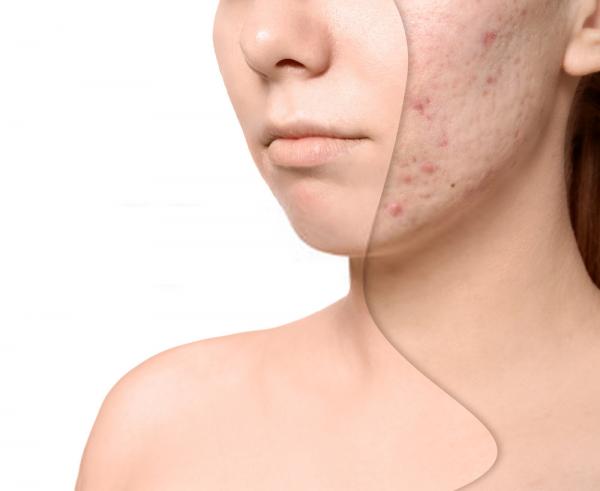
Acne is a multifactorial, complex hormonal and inflammatory condition. It requires treatment which focuses on internal and external factors.
4 secrets to managing acne internally
1. Toxins Fuel Acne
Many acne patients have genetic polymorphisms (SNP’s) that prevent efficient liver detoxification and stop the liver from removing toxins from the body as efficiently as other people. Toxins that can accumulate in the body include metabolic end products, microorganisms, contaminants, pollutants, pesticides, food preservatives, drugs and alcohol. It's possible to help the body detox more efficiently by:
a) Avoiding toxins in our food, water, environment, beauty and personal care.
b) Supporting our liver by drinking warm water with the lemon first thing every morning. Lemon stimulates bile production, and bile releases toxins from our body and stimulates our bowels.
c) Support movement of lymph by exercising daily – a 30 minute walk per day will suffice!
2. Stress makes Acne Worse
Stress triggers 3 hormone pathways that can cause acne. Learning to manage stress and increasing stress resilience, physically and mentally, is crucial for getting rid of acne for good. Some ideas for building stress resilience include:
a) Exercising and sleeping sufficiently
b) Changing our perceptions and reactions to stress
c) Being grateful – research has shown that 21 days of writing 3 things that you're grateful for daily, transitions the nervous system from fight and flight to rest and digest. The body can only heal when we're in our rest and digest mode.
d) Meditation – my favourite is The Morning Meditation by Joe Dispenza
e) Nourish the adrenals by drinking Holy Basil Tea daily - yum yum!
3. Unhealthy gut = unhealthy skin
Over 100 trillion microbes live in our gut and on our skin, and play vital roles in our health and skin integrity. Research has shown that around 90% of all diseases can be traced back to the gut and microbiome. If you're experiencing bloating, indigestion, constipation, diarrhoea, stomach aches, and appetite fluctuations - it's a sign there is inflammation in your gut and a disparity between your beneficial bacteria and your pathogenic bacteria. What causes this disparity? Sugar; stress; toxins; alcohol; pathogens; food sensitivities, drugs; antibiotics and radiation.
How do we start healing the gut?
a) Avoid Sugar
b) Eat Whole foods
c) Kill Pathogens – must do appropriate testing with a qualified practitioner.
d) Heal the gut lining properly with a qualified practitioner.
4. Insulin dis-regulation causes acne
Acne used to be called by doctors “Diabetes of the Skin” because high insulin levels in the blood increase our androgens (male hormones) which increase acne on our face and body. Insulin is a hormone that acts like a key that opens the channel in our cell that allows glucose to enter. When we're insulin resistant, glucose cannot enter the cell and the pancreas sends out more and more insulin. The higher the insulin the higher the androgens increase – the more acne we endure.
How do we balance insulin?
a) Eliminate refined sugar from the diet
b) Eat some sort of protein food first thing in the morning after your lemon water. For example a boiled egg.
4 secrets to managing acne externally
Be mindful that acne is an inflamed, barrier disordered skin. Avoid further skin exposure to procedures that cause inflammation to create a temporary result. Forced exfoliation and products high in acids weaken the skin by lowering nutrient levels, reducing hydration and increasing the propensity for pigmentation and sun damage.
1. Use clean products with transparent info about formulations backed by clinically proven science.
2. Use active topical ingredients that target and activate repair in the skin. FYI - My favourite for acne are: niacinamide, zinc, chlorella and laminaria digitata.
3. Moisturise – when the skin lacks moisture – the enzymes (the messengers) in the skin do not work effectively, which prevents the healing process and increases our skin problems.
4. See a naturopathic skin therapist (our Emily!) for a proper skin analysis and skin prescription.
Contact us to find out how Emily can create a personalised treatment plan to treat your acne, or specific skin concern.

